Nisheeth Srivastava
Posture-Driven Action Intent Inference for Playing style and Fatigue Assessment
Jul 15, 2025Abstract:Posture-based mental state inference has significant potential in diagnosing fatigue, preventing injury, and enhancing performance across various domains. Such tools must be research-validated with large datasets before being translated into practice. Unfortunately, such vision diagnosis faces serious challenges due to the sensitivity of human subject data. To address this, we identify sports settings as a viable alternative for accumulating data from human subjects experiencing diverse emotional states. We test our hypothesis in the game of cricket and present a posture-based solution to identify human intent from activity videos. Our method achieves over 75\% F1 score and over 80\% AUC-ROC in discriminating aggressive and defensive shot intent through motion analysis. These findings indicate that posture leaks out strong signals for intent inference, even with inherent noise in the data pipeline. Furthermore, we utilize existing data statistics as weak supervision to validate our findings, offering a potential solution for overcoming data labelling limitations. This research contributes to generalizable techniques for sports analytics and also opens possibilities for applying human behavior analysis across various fields.
Real-Time Feedback and Benchmark Dataset for Isometric Pose Evaluation
Jun 13, 2025Abstract:Isometric exercises appeal to individuals seeking convenience, privacy, and minimal dependence on equipments. However, such fitness training is often overdependent on unreliable digital media content instead of expert supervision, introducing serious risks, including incorrect posture, injury, and disengagement due to lack of corrective feedback. To address these challenges, we present a real-time feedback system for assessing isometric poses. Our contributions include the release of the largest multiclass isometric exercise video dataset to date, comprising over 3,600 clips across six poses with correct and incorrect variations. To support robust evaluation, we benchmark state-of-the-art models-including graph-based networks-on this dataset and introduce a novel three-part metric that captures classification accuracy, mistake localization, and model confidence. Our results enhance the feasibility of intelligent and personalized exercise training systems for home workouts. This expert-level diagnosis, delivered directly to the users, also expands the potential applications of these systems to rehabilitation, physiotherapy, and various other fitness disciplines that involve physical motion.
Learning to Play Video Games with Intuitive Physics Priors
Sep 20, 2024Abstract:Video game playing is an extremely structured domain where algorithmic decision-making can be tested without adverse real-world consequences. While prevailing methods rely on image inputs to avoid the problem of hand-crafting state space representations, this approach systematically diverges from the way humans actually learn to play games. In this paper, we design object-based input representations that generalize well across a number of video games. Using these representations, we evaluate an agent's ability to learn games similar to an infant - with limited world experience, employing simple inductive biases derived from intuitive representations of physics from the real world. Using such biases, we construct an object category representation to be used by a Q-learning algorithm and assess how well it learns to play multiple games based on observed object affordances. Our results suggest that a human-like object interaction setup capably learns to play several video games, and demonstrates superior generalizability, particularly for unfamiliar objects. Further exploring such methods will allow machines to learn in a human-centric way, thus incorporating more human-like learning benefits.
* 7 pages, Accepted in Proceedings of the Annual Meeting of the Cognitive Science Society, Volume 46
Using Learnable Physics for Real-Time Exercise Form Recommendations
Oct 11, 2023



Abstract:Good posture and form are essential for safe and productive exercising. Even in gym settings, trainers may not be readily available for feedback. Rehabilitation therapies and fitness workouts can thus benefit from recommender systems that provide real-time evaluation. In this paper, we present an algorithmic pipeline that can diagnose problems in exercise techniques and offer corrective recommendations, with high sensitivity and specificity in real-time. We use MediaPipe for pose recognition, count repetitions using peak-prominence detection, and use a learnable physics simulator to track motion evolution for each exercise. A test video is diagnosed based on deviations from the prototypical learned motion using statistical learning. The system is evaluated on six full and upper body exercises. These real-time recommendations, counseled via low-cost equipment like smartphones, will allow exercisers to rectify potential mistakes making self-practice feasible while reducing the risk of workout injuries.
* Accepted by ACM RecSys '23, 12 pages , 7 Figures
Targeted Example Generation for Compilation Errors
Sep 02, 2019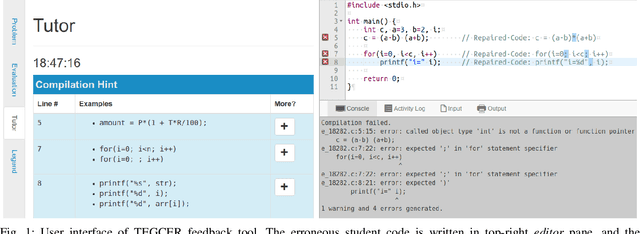
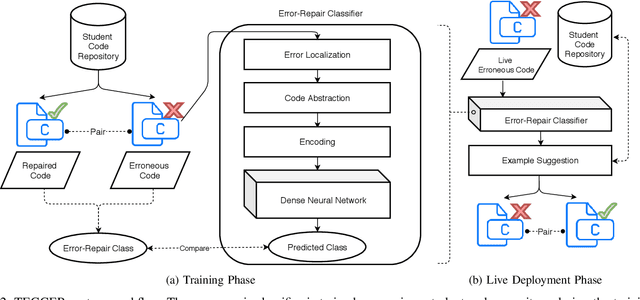
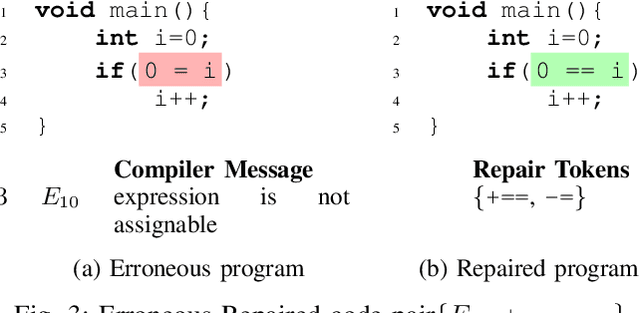
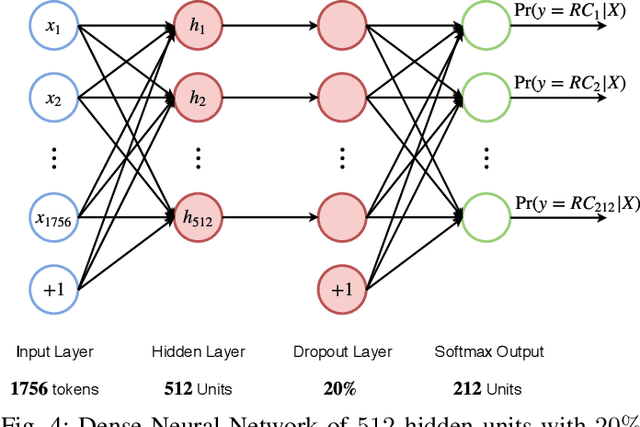
Abstract:We present TEGCER, an automated feedback tool for novice programmers. TEGCER uses supervised classification to match compilation errors in new code submissions with relevant pre-existing errors, submitted by other students before. The dense neural network used to perform this classification task is trained on 15000+ error-repair code examples. The proposed model yields a test set classification Pred@3 accuracy of 97.7% across 212 error category labels. Using this model as its base, TEGCER presents students with the closest relevant examples of solutions for their specific error on demand.
Effective extractive summarization using frequency-filtered entity relationship graphs
Oct 24, 2018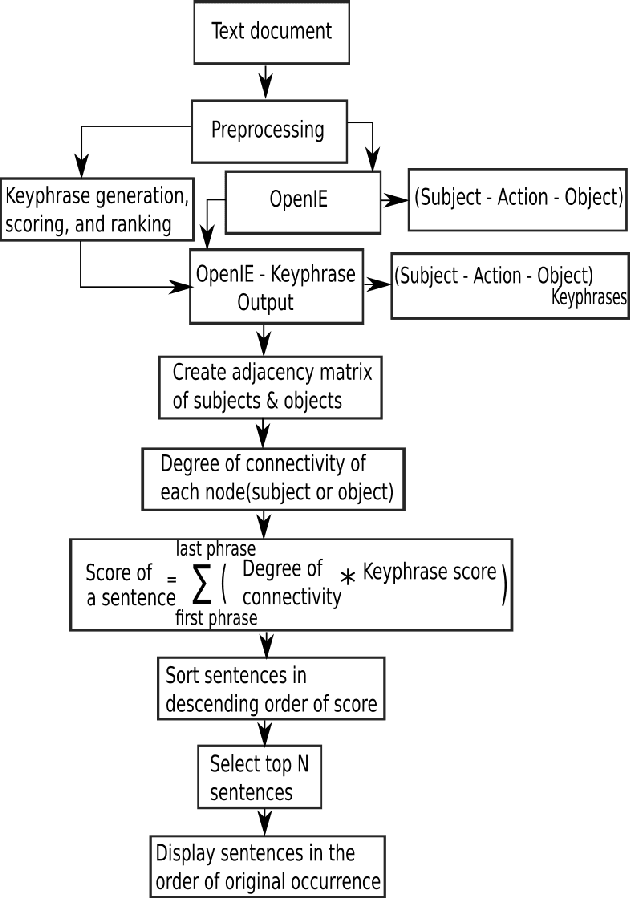
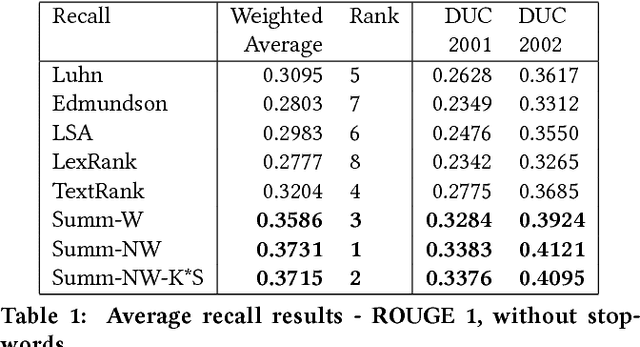
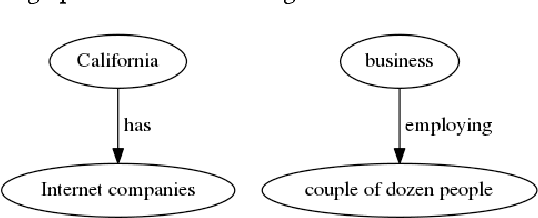
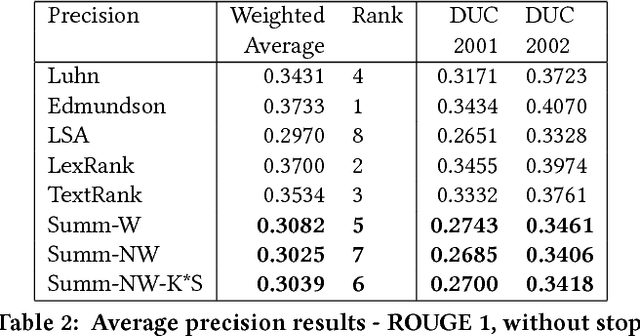
Abstract:Word frequency-based methods for extractive summarization are easy to implement and yield reasonable results across languages. However, they have significant limitations - they ignore the role of context, they offer uneven coverage of topics in a document, and sometimes are disjointed and hard to read. We use a simple premise from linguistic typology - that English sentences are complete descriptors of potential interactions between entities, usually in the order subject-verb-object - to address a subset of these difficulties. We have developed a hybrid model of extractive summarization that combines word-frequency based keyword identification with information from automatically generated entity relationship graphs to select sentences for summaries. Comparative evaluation with word-frequency and topic word-based methods shows that the proposed method is competitive by conventional ROUGE standards, and yields moderately more informative summaries on average, as assessed by a large panel (N=94) of human raters.
Evolvability need not imply learnability
Apr 03, 2009Abstract:We show that Boolean functions expressible as monotone disjunctive normal forms are PAC-evolvable under a uniform distribution on the Boolean cube if the hypothesis size is allowed to remain fixed. We further show that this result is insufficient to prove the PAC-learnability of monotone Boolean functions, thereby demonstrating a counter-example to a recent claim to the contrary. We further discuss scenarios wherein evolvability and learnability will coincide as well as scenarios under which they differ. The implications of the latter case on the prospects of learning in complex hypothesis spaces is briefly examined.
 Add to Chrome
Add to Chrome Add to Firefox
Add to Firefox Add to Edge
Add to Edge